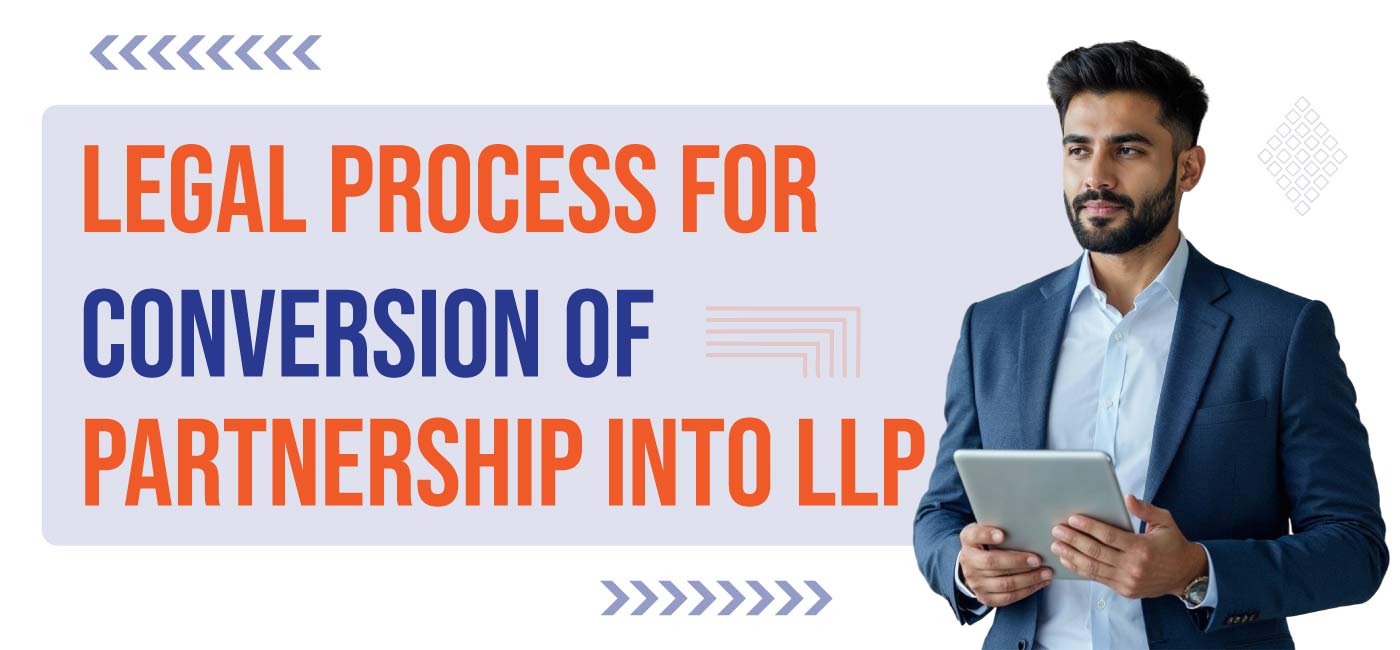Convert Your
Partnership into a LLP
Service packages start at just INR 14,999/- only.
Trusted by 5000+ clients worldwide for compliance and business registration services.

Rated 4.8/5 by trusted clients
Service packages start at just INR 14,999/- only.
Trusted by 5000+ clients worldwide for compliance and business registration services.

Rated 4.8/5 by trusted clients
Conversion of a Partnership Firm to LLP is the legal process of transforming a traditional partnership into a Limited Liability Partnership (LLP) under the LLP Act, 2008. An LLP combines the advantages of a partnership, such as flexibility and low compliance, with the added benefit of limited liability for its partners.
This means the personal assets of partners remain protected, unlike in a traditional partnership where partners are personally liable for debts. The LLP also has a separate legal identity, which builds more credibility with clients, vendors, and financial institutions.
Many small and medium-sized businesses prefer this conversion as it helps them grow, attract investors, and limit financial risks while keeping compliance requirements simpler than a company.

EbizFiling has helped 5,000+ businesses across India with conversions, company formations, and compliance services. Our expert team of CAs, CS, and legal professionals ensures that your Conversion of Partnership to LLP is smooth, accurate, and completed on time.
We manage the entire process from drafting documents, preparing partner agreements, filing forms with ROC, to guiding you through post-conversion compliance. Our packages are designed to be affordable, transparent, and reliable.
Connect with our Compliance Manager at +91 96432 03209 or email us at info@ebizfiling.com for a free consultation.
(All Inclusive)
Partners are not personally liable for debts; liability is limited to their contribution.
LLPs are trusted more by banks, clients, and investors compared to partnerships.
LLPs enjoy lower compliance costs and tax flexibility compared to companies.
The LLP has its own identity, independent from the partners.
The LLP continues to exist even if partners change or exit the business.
Ownership can be transferred by adding or removing partners through agreement.
A small procedure for your quick understanding
Get consent
Apply for DSC & DIN
Reserve LLP name
File forms with ROC
Receive LLP certificate

An LLP offers partners protection from personal liability, which means their personal assets are not at risk for business debts. It also provides higher credibility and legal recognition compared to a traditional partnership while maintaining flexibility and easier compliance.
The conversion is carried out under the LLP Act, 2008, and filings are done online with the Ministry of Corporate Affairs (MCA). Once approved, the Registrar of Companies (ROC) issues the Certificate of Registration.
Yes, unanimous approval from all existing partners is required. Without written consent of every partner, the conversion process cannot be initiated or approved by the ROC.
No, there is no fixed minimum capital requirement for LLPs. Partners can contribute any amount, making it easier for small firms to convert without heavy investment.
Yes, all the current partners of the firm automatically become partners of the LLP. Their profit-sharing ratio and rights can be carried forward or restructured in the LLP Agreement.
The conversion typically takes 3–4 weeks, depending on how quickly documents are prepared and how fast the Registrar processes the application. Delays may occur if forms are incomplete or approvals are pending.
All the assets, contracts, obligations, and liabilities of the partnership are automatically transferred to the LLP. This ensures continuity of business without disruption.
Yes, a new PAN card must be obtained in the name of the LLP, and GST registration must also be updated. Old registrations in the partnership firm’s name will no longer be valid.
Yes, foreign nationals or companies can be partners in an LLP, but this is subject to FEMA and RBI guidelines. Prior approvals may be required if foreign investment is involved.
An LLP audit is only required if its turnover exceeds ₹40 lakhs or partner contribution exceeds ₹25 lakhs. For smaller LLPs, audits are optional, which reduces compliance costs.
Yes, but the firm must obtain written approval from creditors. This ensures creditors’ rights remain protected, and the LLP takes over responsibility for existing debts.
Employees of the partnership continue working for the LLP without losing their rights. Their employment contracts remain valid under the new LLP structure.
Yes, the Registrar of Companies issues a new Certificate of Registration after conversion. This certificate is the official proof of the LLP’s legal existence.
Yes, an LLP can later be converted into a Private Limited Company if business expansion requires it. This involves a separate process under the Companies Act.
LLPs must file Form 11 (Annual Return) and Form 8 (Statement of Accounts and Solvency) every year. Non-compliance can lead to heavy penalties by MCA.
No, taxation for LLPs is similar to partnerships. However, LLPs enjoy greater flexibility in compliance and benefit from limited liability protection.
Yes, stamp duty may be applicable when drafting the LLP Agreement. The exact amount depends on the laws of the state where the LLP is registered.
At least two partners are required to form an LLP. There is no upper limit on the maximum number of partners.
Yes, even unregistered partnerships can apply for conversion. However, proof of business existence, such as partnership deed or tax filings, must be submitted.
EbizFiling manages the entire process—partner consents, documentation, ROC filings, and post-conversion compliance. Our experts ensure a smooth transition with minimal effort from your side.
Service packages start at just INR 14,999/- only.
Trusted by 5000+ clients worldwide for compliance and business registration services.
It was a wonderful experience with ebiz filing I had opted for company incorporation package specially Ayushi Mam and Pulkit sir they helped me a lot .Thank you so much dear mam and sir It was very smooth process.I will recommend to everyone
They have it all! You tell them your problem and they will have you covered with their services and support. Great going, Ebizfiling.
The team at ebizfiling is extremely professional and customer friendly.. they helped me set my new business and did a great job. Thanks so much Anuja and team for getting this done. Means a lot. 👍👍
